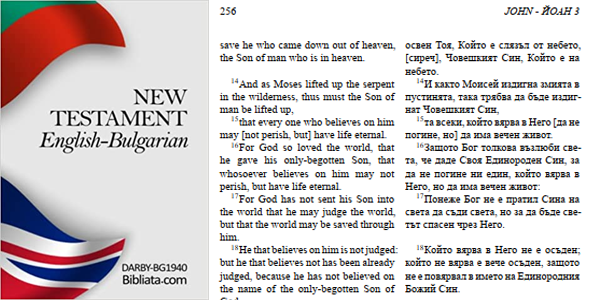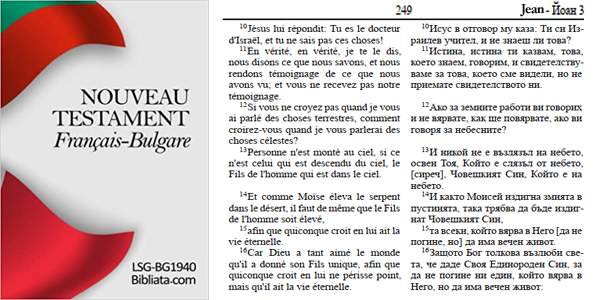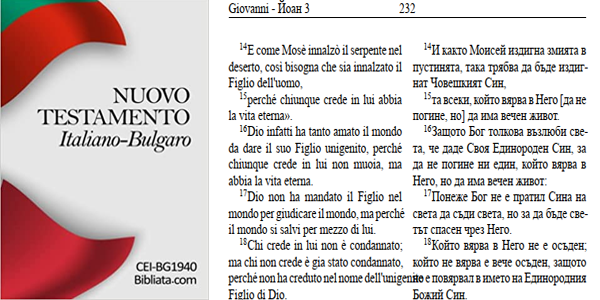15 Prophetic Signs of Jesus’ Imminent Return
1. The world’s focus would be on the Middle East.
2. Russia would begin to align with key Muslim nations.
3. Israel would be surrounded by those bent on its annihilation.
4. Anti-Semitism would dramatically escalate.
5. Religious deception would be rampant.
6. Political chaos would increase, and a political star with plausible solutions would rise up.
7. Extreme famines would occur in different parts of the world.
8. There would be wars and rumors of war, especially relative to the Middle East and Israel.
9. Epidemics and pandemics would spread.
10. Earthquakes and natural disasters would escalate in frequency and intensity.
11. Technology would advance in astonishing ways.
12. Terrorism would jump to the forefront.
13. There would be an abnormal emphasis on sex and materialism, and morality would be twisted.
14. Betrayals, multiplying family problems and resistance to God’s messages would be prevalent.
15. A genuine, Holy Spirit-led revival would emerge as a remnant of godly believers focused on the Lord Jesus Christ and His power.
SIGNS of the LAST DAYS: Increase in persecution of Christians

SIGNS of the LAST DAYS: The Mark of the Beast

ACTS 20:24

2023 in RETROSPECT
in 2023 Revival Harvest Campaign extended to 8 weeks alone in TN, and then the Carolinas and Florida. This time, we ended up extending the length of the campaign four times, even after we were ready to close it at the end of November. Finally, in December, the Lord swiftly opened another door for us to present our new Bulgarian-Spanish New Testament in Honduras.
We’ve been able to keep our services along with our weekly Bible Broadcasts in Bulgaria. Without a central building, our Fall and Christmas services were held only in local churches. With the current COVID restrictions in play, it is virtually impossible to rent auditoriums for large gatherings as we have done in the past. As soon as the weather there allows it, we will return to open air and camp services for special occasions. The building situation is turning to be of concern and continues prayer focus in the post-pandemic reality. We are also working on several Bible projects in the spring, that will be finalized before the summer in time to aid our work on the Balkans in 2023. Revival must go on!
The text of the Bulgarian Bible is printed in the United States. The revision methodology used in the editing of the original text is patented and protected by PCT international patent law and may not be duplicated. Copyright © 1990-2023 by Bibliata.com.
English-Bulgarian New Testament
English Bulgarian New Testament Vol. 1 New Bible Diglot Series by Bibliata.com (2022)
The Darby Bible was first published in 1890 by John Nelson Darby, an Anglo-Irish Bible teacher associated with the early years of the Plymouth Brethren. Darby also published translations of the Bible in French and German. J. N. Darby’s purpose was, as he states in the preface to his English New Testament, to make a modern translation for the unlearned who have neither access to manuscript texts nor training and knowledge of ancient languages of the Scriptures. Darby’s translation work was not intended to be read aloud. His work was for study and private use. In his own oral ministry he generally used the English KJV Bible.
Nuevo Testamento Español-Búlgaro
Nuevo Testamento Español-Búlgaro Vol. 2 New Bible Diglot Series by Bibliata.com (2022)
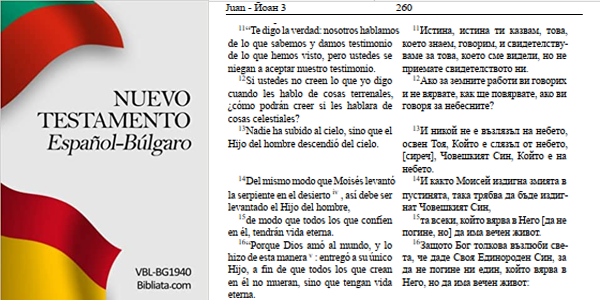
The translation has been made directly from the standard Nestle-Aland Greek text. Its purpose is to be a faithful translation of its original meaning, without difficult or confusing terms. The style has been translated into contemporary English and Spanish, avoiding the use of slang or colloquial words, thus speaking to our modern society in a way that everyone can understand.
Neue Testament Deutsch-Bulgarisch
Neue Testament Deutsch-Bulgarisch Vol. 3 New Bible Diglot Series by Bibliata.com (2022)
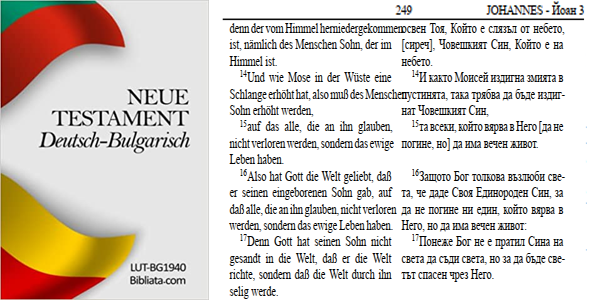
The Luther Bible is a German language Bible translation from Hebrew and ancient Greek by Martin Luther, of which the New Testament was published in 1522 and the complete Bible, containing the Old and New Testaments and Apocrypha, in 1534. The language was updated in 1912.
This Bible is in the public domain in the United States. We are making it available in the same format in which we acquired it as a public service.
Nouveau Testament Français-Bulgare
Nouveau Testament Français-Bulgare Vol. 4 New Bible Diglot Series by Bibliata.com (2022)
The LSG was published in 1910 as the classic French equivalent of the English King James Version. Louis Segond French Bible – (October 3, 1810 – June 18, 1885), was a Swiss theologian who translated the Bible into French from the original texts in Hebrew and Greek. He was born in Plainpalais, near Geneva. After studying theology in Geneva, Strasbourg and Bonn, he was pastor of the Geneva National Church in Chêne-Bougeries, then from 1872, Professor of Old Testament in Geneva. The translation of the Old Testament, commissioned by the Vénérable Compagnie des Pasteurs de Genève, was published in two volumes in 1871 (Meusel has 1874 as the publication date), followed by the New Testament, translated as a private venture, in 1880. The text was then reviewed by experts. The result is the 1910 revision that is now freely available on Internet.
Nuovo Testamento Italiano-Bulgaro
Nuovo Testamento Italiano-Bulgaro Vol. 5 New Bible Diglot Series by Bibliata.com (2022)
An Italian translation of the Holy Bible according to the Roman Catholic canon, based on the original texts and meant to be typical for use in liturgy, approved by the Italian Conference of Catholic Bishops and published in 2008. The previous 1974 edition is taken into account, but it is often corrected, while trying to reflect recent advances in Biblical exegesis, and to respect the literary style of different Biblical authors. The Book of Esther offers two parallel translations (second translation is offered in module CEI2008-2), based on the Greek text and on the Hebrew text.
For Christmas, Bulgaria dismantled a Soviet monument
SOFIA, Bulgaria — Bulgaria on Wednesday began dismantling a monument to the army of the Soviet Union that dominated the skyline of the capital, Sofia, for nearly 70 years and was widely seen as a symbol of Russia’s influence in the Balkan country.
The monument was erected in 1954 to commemorate the 10th anniversary of Soviet forces entering Bulgaria, which had been allied with Nazi Germany in World War II. Their arrival in 1944 marked the beginning of 45 years of hardline Communist rule.
Following the collapse of communism in 1989, the local council in Sofia voted to remove the monument, but successive governments shied away from taking the final step.
On Wednesday, following years of heated debate, workers began to dismantle the 45-meter-high (147-foot) installation, removing the figures at the top, which showed a Soviet soldier holding an automatic rifle, a woman with her child, and a worker.
Vyara Todeva, regional governor of Sofia, said that for 70 years the monument was never restored and serious cracks had appeared in the figures.
It will take at least a month to dismantle the whole monument, she said, and the figures will likely be taken to the Museum of Socialist Art in Sofia.
In recent years, the monument has become a focal point of the deep divisions between pro-Russian and pro-Western groups in Bulgaria’s society. It has often been covered with paint by unknown artists, lately with the blue and yellow colors of the Ukrainian flag.
A heavy police presence was dispatched to secure the area around the monument and to prevent possible clashes between those in favor and those opposed to its removal.
The Socialists and other pro-Moscow groups in Parliament who fiercely oppose the monument’s removal said they would seek to organize a referendum on its fate. They said “similar anti-fascist monuments are standing untouched in many European cities”.
They received strong backing from Moscow, where the spokeswoman for the Russian Foreign Ministry, Maria Zakharova, said the dismantling would worsen relations with Bulgaria.
Looking Over the Wall: A Psychological Exploration of Communist and Post Communist Bulgaria
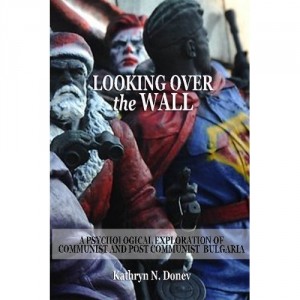 Looking Over the Wall: A Psychological Exploration of Communist and Post Communist Bulgaria
Looking Over the Wall: A Psychological Exploration of Communist and Post Communist Bulgaria
This book is the result of over a decade of research and personal experiences of living in Bulgaria for the past seven years. It embodies documents, articles, personal interviews and essays dealing with psychological explorations of communist and post communist Bulgaria. Along with a historical overview of Bulgaria, the author presents the development of psychotherapy throughout the country and addresses future concerns for the state of counseling within a post communist context. Furthermore, the author examines the Pentecostal experience of the Bulgarian evangelical believer drawing on a paper presented at the 36th annual Society of Pentecostal Studies Conference. As well included is original research which develops a theoretical account of the sequences of internal motivation in addition to student survey results regarding counseling practices from the first Master’s in Chaplaincy Ministry Program in Europe at the Bulgarian Evangelical Theological Institute.
Preview and Purchase Your Copy at Amazon.com
Celebrating 15 Years of Chaplaincy on the High Seas
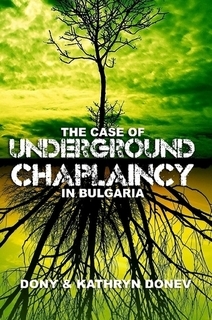 We began our literal journey of ministry on the high seas in 2009. After exploring the opportunity for several years’ prior and submitting applications to various chaplaincy organizations which dealt with such ministry, the doors finally opened for Cup and Cross.
We began our literal journey of ministry on the high seas in 2009. After exploring the opportunity for several years’ prior and submitting applications to various chaplaincy organizations which dealt with such ministry, the doors finally opened for Cup and Cross.
This search for a ministerial identity and its proper application in the real world coincided with the start of the Master’s in Chaplaincy Ministry Program which we designed for the Bulgarian Evangelical Theological Institute in Sofia around 2008-2009. The long standing relationships with professors, active military chaplains from various fields and countries, and the wisdom of several Generals in the field helped us calibrate our ministry focus with what is needed by real people in the real world.
The new fad “to be real” is not enough in a realistic ministry setting. When 25ft. high storm waves beat the aft and the ship is thrown towards the dark wall of ocean waters ahead, one cannot help but “to be real” and depend on a very real and skilled crew. A captain alone cannot run the boat through a storm even if all systems are reported working. It is the crew deep down in the engine room and making its way on the slippery deck that makes it all happen.
The Crew. Some of them have not seen their families for months or even a year at times. They struggle with the same fears and anxieties as the rest of us. Except, while the rest of us can hold on to something for dear life, the crew is obligated by duty to continue to serve and move the boat ahead. The little chapel on the top deck becomes a passage to a lagoon past the riffs of stormy life where stories are shared, prayers are lifted up together and human lives are reclaimed anew for Heaven.
We have found these nontraditional paths of travel and ministry yielding the most unique encounters and connections for Kingdom growth. Our family is thankful for these 10 years and looking forward to even more means of ministry outside of the four church walls. If you would like for us to come to your church as share our journey feel free to reach out to us.
Also important [click to read]:
- U.S. Department of State recognizes our chaplaincy efforts in Bulgaria
- Bulgarian Chaplaincy Association: Integration Proposal with Local NATO Programs
- Bulgarian Chaplaincy Association: Vision and Resolution
- Chronology of our role and involvement in developing Church of God chaplaincy in Bulgaria since 2001
- Master’s of Chaplaincy Ministry Program in Bulgaria Reflections
- The Past Decade of Chaplaincy in Bulgaria (2006-2016)
- Related Publications and Presentations by Cup & Cross Ministries International
More Publications on the Topic and History of Events:
- Chaplaincy Conference and Master’s of Chaplaincy
- Chaplaincy Course in Yambol, BULGARIA
- Bulgarian Chaplaincy Association Annual Meeting
- Family Seminar for Military Men and Women
- Cup & Cross Ministries in Church of God Publications
- The Case of a NATO Chaplaincy Model within the Bulgarian Army
- 10 Years of Military Ministry in Bulgaria
- National Chaplaincy Conference
- Bulgarian Chaplaincy Association Gains Legal Status
- Chaplain Dees Visits Bulgaria
- Chaplaincy Course at the Bulgarian Evangelical Theological Institute
- Bulgarian Chaplaincy Association
- Meeting the NATO Chaplain
- National Chaplaincy Meeting
- Chaplaincy Developments in Bulgaria
- U.S. Bases in Bulgaria
- National Chaplaincy Meeting
- Chaplaincy in Bulgaria
- HEALTHCARE CHAPLAINCY IN BULGARIA
- Chaplaincy in Bulgaria
- Mission Bulgaria
Missional in La France
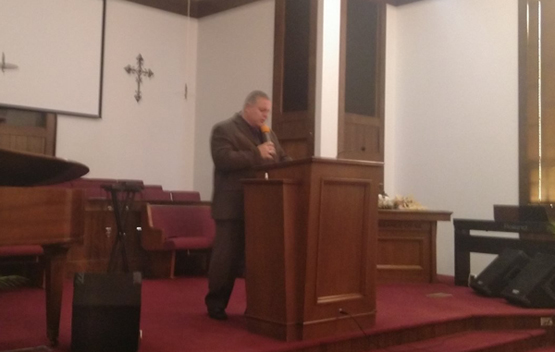
Bulgarian Pentecostalism at ORU
December 10, 2023 by Cup&Cross
Filed under Featured, Missions, News, Publication
THE ROLE OF WOMEN IN THE ESTABLISHMENT OF THE PENTECOSTAL MOVEMENT IN BULGARIA
Publication: Society for Pentecostal Studies Annual Meeting Papers (ORU Only Access)
Download Date: 03/2021
SPIRIT-EMPOWERMENT OF THE POOR IN SPIRIT: DR. NICHOLAS NIKOLOV AND THE ESTABLISHMENT OF THE BULGARIAN ASSEMBLIES OF GOD IN 1928
Publication: Society for Pentecostal Studies Annual Meeting Papers (ORU Only Access)
Download Date: 03/2018
“Historical and Doctrinal Formation of Holiness Teachings and Praxis Among Bulgarian Pentecostals”
Publication: Society for Pentecostal Studies Annual Meeting Papers (ORU Only Access)
Download Date: 01/2015
The (Un)Forgotten: Story of the Voronaev Children
Publication: Society for Pentecostal Studies Annual Meeting Papers (ORU Only Access)
Download Date: 01/2011
25 Years of Revivals in America
Thankful for 25 Years of Revivals in America
After 33 years of ministry, more than half of it on this side of the globe, we have now preached revivals in America for over quarter of a century. I have lost count how many times we’ve crossed from the Dakotas to Texas, and from the Carolinas to California to preach the Gospel to all willing to hear. I do remember one time when we drove 18 hours straight to Minneapolis, preached a single sermon, turned around and drove back the same distance due for another appointment. I’ve recorded every place, time and sermon. If needed, I can calculate the distance of getting there and back in total millage too. I’ve long lost the count of sets of brakes and tires worn-out during travel. Maybe, the next 25 years I’ll just fly! But through all this, I’ve often stood at a church parking lot, spent out from preaching, looking at the blue sky above and realizing: I am living my dream. Preaching is all I’ve always wanted to do!
Two times, apart from the 1990 post-Communist revival in Bulgaria, we have experienced continuing Holy Ghost revival in America. The first time was in the summer of 1999 in South Carolina, where one revival night multitudes were called to the ministry and on other nights, we just could not close the services with the power of God so powerfully evident. If you were a pastor back then, we most probably preached in your church one of these revivals, which are now marked by our 25-year anniversary.
In 1999, our revivals were weeks before the Y2K. Perhaps naively, I contributed the unusual move of the Spirit and extraordinary attendance to the turn of the 21st century. We were forced to see things a bit more prophetically, when we were hit by a fresh wave of revival pre-pandemic in the Spring and Summer 2019. Along with preaching virtually daily during the revival season, we were able to publish our New Testament Interlinear in Bulgaria and distribute it to our churches just before the shutdown.
This time, the revival in 2023 came a bit sooner than the usual decade-long cycle we had experienced with the past two. As we are getting ready to continue our 2023 Revival Harvest Campaign with a Community Communion service just in time for Thanksgiving this week, we have completed two full months of revivals in Polk County. Some 50 back-to-back services can truly change one’s perspective on our days! That God is at work is not even in question here, but what about the Church?
Exactly 20 years ago in his book “A Call to Righteousness: Impending Judgment,” Dr. David Franklin outlined the cycle of repentance for a nation’s revival as following:
- When a nation persists in violence, the Sovereign Lord confronts and holds responsible,
- When a nation forgets God, He allows for times of repentance,
- If repentance is ignored, God will expose and execute judgment on an unfaithful nation.
Every time God renews His covenant with His people, He shows His presence! (a) We know that God is present in the covenant, because He shows His glory. It happened to Moses and his generation. And it also happened to Solomon several hundred years later. (b) When a generation loses the vision of the Glory of God, God begins renewing His covenant again with a new generation. (c) God is not satisfied with a people who know the signs and the blessings of the covenant. He rests not until He is revealed as the God of the Covenant!
This Biblical truth is valid for any nation in the world, and I often draw a painful parallel of similarities with my home country of Bulgaria; where in October the 7th government elections since the start of the 2020 pandemic did not produce the desired change. Though the voting machines imported from Venezuela were pulled out a day before the election for obvious reasons, the vote went in history as the lowest ever with only 33% participating. This halted the acting government, setting the country for another parliamentarian election in 2024. With two regional wars now (Ukraine and Israel) and record high inflation, Bulgaria is walking a close line to another national crisis as we experienced back in 1997. In the midst of this, the Church of God Balkan Ministry Center in Sofia, which was initially sold in 2021, is back on the market with first installment toward its purchase made on November 16, 2023.
Meanwhile, on the national Day of National Awakening (celebrated after All Saints Day on November 1st), we were able to release and present the first Greek-Bulgarian Interlinear of the New Testament online. Its name, Evangelieto.com, means The Gospel in Bulgarian. This new website is a natural continuation of Bibliata.com – the first Bulgarian Bible online, we released back in the fall of 1996. This new online edition, which has been in the works since 2016, is dedicated to those students of the Bible, who prefer working with the original texts, rather than using the multitude of new Bible revisions often with religious and ideological orientation. The Greek-Bulgarian Interlinear of the New Testament online proposed the following solutions to the Bulgarian Bible translation:
- A non-received text – Textus Haud Receptus
- Critical Edition of the Greek New Testament (Tischendorf, Westcott&Hort, Nestle-Aland, UBS and SBL)
- Literal translation from Greek, made word for word without dynamic equivalents
- Linguistic paradigm for repetitive parallel permutation structures in the Greek-Bulgarian translation
- Analytical Greek New Testament with complete morphology of the words
- Complete textual commentary of the New Testament with thousands of references
- Audio/video reading of the verse with its original and consequent variations
- Discussion board under each verse for pastors and ministers to offer their thoughts on the text.
Thankful for 25 Years of Revivals in America: Revival Must Go On!



